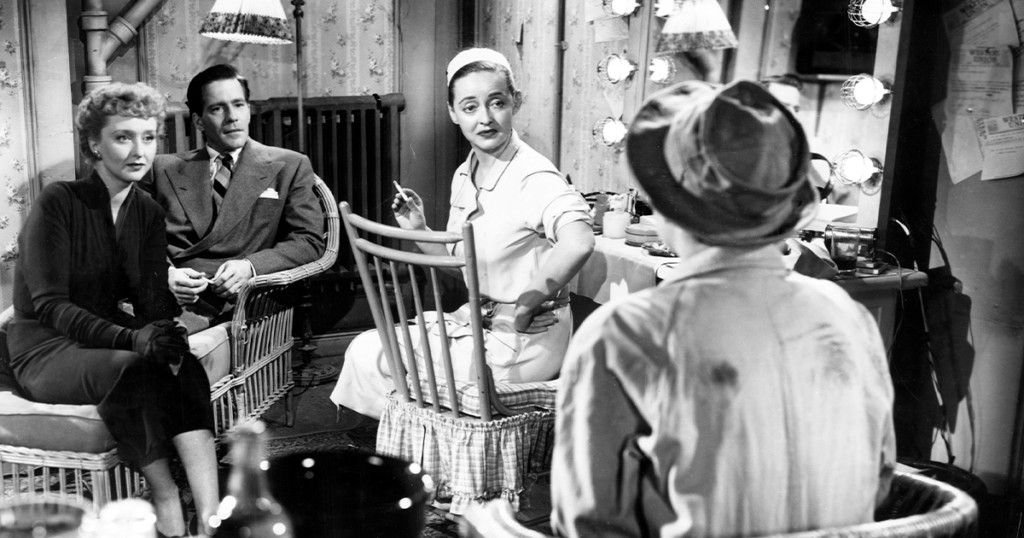
Nearly all classic movies end on a note of exceptional pathos, irony, or humor. Take “there’s no place like home,” “tomorrow is another day,” and “nobody’s perfect,” which perfectly match the movies they conclude: The Wizard of Oz, Gone with the Wind, and Some Like It Hot. The first of these concluding lines states the moral of Dorothy’s story, the second sums up the indomitable character of Scarlett O’Hara, and the third is the perfect punchline for a joke that’s gone as far as it could go.
Below is a list of 10 other terrific last lines. Test your knowledge using only the hints provided below—then read on for the answers and explanations.
1. “Hello, America, hang on to your lights; they’re the only lights in the world.”
Hint: Windmills.
2. “Miss Harrington knows all about it.”
Hint: The drama critic can help make it happen.
3. “Always the same. People come. People go. Nothing ever happens.”
Hint: Revolving door.
4. “Ah, what’s the difference?”
Hint: Cheap luggage.
5. “What do we do now?”
Hint: Vote for me!
6. “Lazy legs.” “Jeepers, I love you, Johnny.”
Hint: Echoes in the mind of a man on a park bench.
7. “The old man was right, only the farmers won. We lost. We’ll always lose.”
Hint: Minus five, leaves two.
8. “Maybe I’ll live so long that I’ll forget her. Maybe I’ll die trying.”
Hint: Mirrors, mirrors, on the walls. And guns.
9. “Frankie, your mother forgives me!”
Hint: Ave Maria.
10. “. . . the first known instance of a man who was killed because he had lousy ratings.”
Hint: Mad as hell.
The Answers:
1. Foreign Correspondent (directed by Alfred Hitchcock, 1940)
Dutch windmills play a prominent role as hiding places or ambush hangouts in Hitchcock’s Foreign Correspondent, which concludes with a peroration from Joel McCrae at his most charming, urging America to resist the Nazi darkness.
2. All About Eve (dir. Joseph Mankiewicz, 1950)
The phrase “all about” shows up in the last line of All About Eve. It is spoken by scheming drama critic Addison DeWitt (George Sanders) to a young actress who wants to imitate Eve Harrington (Anne Baxter), who has usurped Margo Channing (Bette Davis)’s reign as queen of Broadway.
3. Grand Hotel (dir. Edmund Goulding, 1932)
The quoted lines occur in a voiceover as people enter and exit a hotel’s revolving door. In Grand Hotel John Barrymore plays a baron and jewel thief, Wallace Beery plays a tycoon, Joan Crawford plays a stenographer, and Greta Garbo plays a ballerina who utters an even more famous line, “I want to be alone.”
4.The Killing (dir. Stanley Kubrick, 1956).
Sterling Hayden, the mastermind of a racetrack heist, has entrusted the take to an unworthy suitcase, which bursts open when it falls from the vehicle conveying passengers’ luggage from airport to airplane. He utters the film’s last words, admitting defeat, when the cops close in on him and his girlfriend (Colleen Gray).
5. The Candidate (dir. Michael Ritchie, 1972)
Robert Redford, running for office as a supposedly genuine individual allergic to politics, becomes so reliant on his chief political adviser (Peter Boyle) that he asks this question, confessing his helplessness, after winning the governorship.
6. Scarlet Street (dir. Fritz Lang, 1945)
The ghosts of Joan Bennett and Dan Duryea continue their sexy banter in poor Edward G. Robinson’s mind as he sits forlorn, a bum on a bench in Central Park, whose paintings fetch big money, though no one knows he painted them.
7. The Magnificent Seven (dir. John Sturges, 1960)
John Sturges directed this adaptation of Akiri Kurosawa’s wonderful Seven Samurai, translating the Japanese warrior class to cowboys and bandits. Yul Brynner speaks this line to Steve McQueen at the end of the film. Though the seven have liberated the farmers from the thieves preying upon them, four of their band (James Coburn, Charles Bronson, Robert Vaughn, and Brad Dexter) have gone to their graves; another (Horst Buchholz) has elected to stay in Mexico and marry his girlfriend. The survivors know they are the last of a breed. Bonus fact: Elmer Bernstein’s unforgettable soundtrack became the theme of the Marlboro Man advertisements.
8. The Lady from Shanghai (dir. Orson Welles, 1947)
Orson Welles mutters this parting line after emerging as the sole survivor of the wreckage in a San Francisco fun house hall of mirrors, where spouses Rita Hayworth and Everett Sloane shoot bullets at each other’s images.
9. The Informer (dir. John Ford, 1935)
Victor McLaglen as Gypo, the protagonist of The Informer, has betrayed Frankie McPhillip of the IRA and must now endure the slings and arrows of his outraged ex-comrades—but he dies happy in a church, his body splayed on the floor in the manner of a crucifix, because Frankie’s mother has forgiven him.
10. Network (dir. Sidney Lumet, 1976)
In Paddy Chayefsky’s great screenplay, the crazed newscaster (Peter Finch) urges everyone to open their windows and shout: “I’m mad as hell, and I’m not gonna take this anymore.” And people do just as they’re told.

